The Basque National Orchestra and Robert Trevino record together for the first time
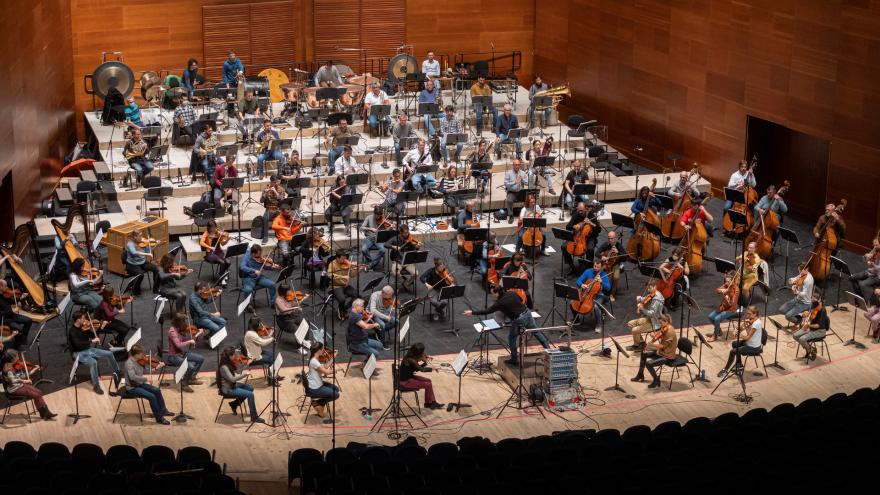
The recordings will be launched in the record market by the international label Ondine Records and will involve two very different registers: the most symphonic and universally popular Ravel and a compendium of little-known American composers.
The Kursaal Auditorium has become a recording studio for this project in order to capture the most universally popular and symphonic Ravel with a fully deployed Basque National Orchestra. This recently launched recording partnership with the Ondine label began in mid-September with the recording of a series of works by little-known American composers and starts again this week with the great composer from Ziburu, Maurice Ravel.
Maurice Ravel is a composer that the Basque National Orchestra regards as its own, and after achieving prominence conducting his work in numerous performances in the concert season and also at the Théâtre des Champs-Élysées in Paris last January, Trevino wanted to immerse himself once again in Ravel’s music. This is the first time that the American has recorded Ravel, but it is not the first time for the orchestra, given that its extensive music library includes another recording devoted entirely to Ravel made in the year 2000 with the principal conductor at that time Gilbert Varga and Joaquín Achúcarro. That recording included the two piano concertos by the Bilbao-born pianist and Alborada del gracioso, which is now being recovered together with La Valse, Bolero, Rapsodie Espagnole, Pavane pour une infante défunte and Une barque sur l´océan. It is an important recording for both the orchestra and the chief conductor and which they hope will occupy a prominent place in the record market. The recording is currently taking place in the Kursaal Auditorium, and an extra platform has been added to its large stage so that the ninety or so musicians tackling the grand symphonic work of Ravel maintain the safe distances required today.
This recording, which will be available both as a CD and online, will be released on the prestigious Finnish label Ondine. Trevino has secured an annual recording commitment from this record company that began successfully a few months ago with the recording of the entire Beethoven symphonies with the Malmö Symphony Orchestra, of which he is also the chief conductor. And now he is beginning his recording adventure with the Basque National Orchestra with this twin recording of Ravel at his most symphonic and lesser-known American composers. Both recordings will be released during the year 2021 and will be the first made by the Basque National Orchestra under chief conductor Robert Trevino:
“I am very excited to announce that the Basque National Orchestra, Ondine and I have joined together to begin an adventure with several new projects. I have worked with Ondine exclusively for some time while also working with the orchestra, but it is now that we join forces to record together for the first time. For the occasion, we have chosen to make a purely American record focusing on composers who are not at all well known, even in the USA. During this time working with the Basque National Orchestra I have brought a lot of American music with me and it makes sense that we explore this repertoire that is unique to our orchestras. At the same time, we have a special interest in focusing on the music of Basque composers. In these four years here we have spent a lot of time exploring the music of Maurice Ravel, surely the most famous of the Basque composers. That is why we want to share what this orchestra knows about Maurice Ravel and how it understands his language with the world. Ondine will accompany us on this journey. We are very excited about what we are creating and what we are going to do in the future. I hope you join us. Thank you.”
‘American Composers’
This is the provisional title of the compilation of four works composed by a number of the most important American composers from the last century who even today do not receive the recognition they deserve. These are relatively little-known works, a repertoire that moves away from the music of the “big circuit” and that the Basque National Orchestra has recorded under the direction of its American chief conductor Robert Trevino.
The selected composers include Howard Hanson and his work Before the Dawn, whose recording represents a world premiere, and Charles Martin Loeffler, in which the orchestra’s viola soloist, Delphine Dupuy, has employed the viola d’amore to give voice to La Mort de Tintagiles. This American-flavoured recording is completed with Henry Cowell’s Variations for orchestra and Evocations by Carl Ruggles.
Ondine
Ondine, part of the Naxos group, is one of the most prestigious independent record labels in the world and has made numerous recordings with other important conductors such as Christoph Eschenbach, Vladimir Ashkenazy, Esa-Pekka Salonen and Hannu Lintu. “Ondine chooses artists with whom we can work in a meticulous way,” stresses the founding director of the label, Reijo Kiilunen. “We try to work with only a few outstanding artists, those who offer visionary and imaginative interpretations of the typical repertoire, and who have an adventurous mind that leads to us presenting fascinating lesser-known musical discoveries to audiences. Robert Trevino perfectly meets those requirements, in that he is a director of great musical power with an original and inquisitive mind.”
Reijo Kiilunen continues, “We were more than delighted with the Beethoven symphonies that Robert has just recorded with the Malmö Symphony Orchestra and we always knew that we also wanted to record his orchestra, the Basque National Orchestra. They have a very characteristic and distinctive approach and a fabulous sound, and I thought this idea of the American conductor leading them in the music of a Basque genius, and then the Basque orchestra playing American music was a great one. I think we are going to have two fantastic new albums by Robert and the Basque National Orchestra.”
Jaume Santonja, new Associate Conductor of the Basque National Orchestra
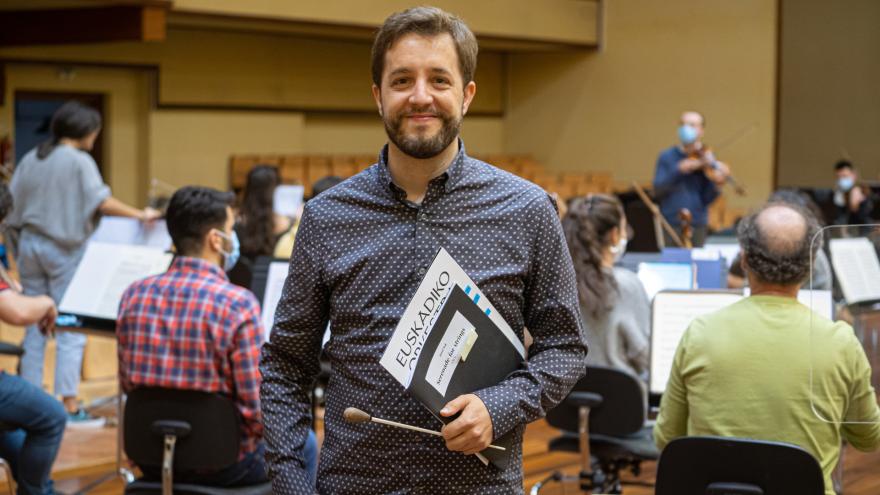
The young maestro will be joining the Basque National Orchestra to carry out assistance tasks during the 2020/2021 Season.
This week young maestro Jaume Santonja will start his journey as Associate Conductor of the Basque National Orchestra, a position he will hold throughout the current Season. This beginning will feature his participation in the first educational activity of its own carried out by Musikene and the Basque National Orchestra, where pupils from the Master's Degree in Orchestral Studies at the higher school of music carry out practical orchestral work with other musicians from the professional orchestra.
Jaume Santonja is ‘very happy’ to start his collaboration with the Basque National Orchestra with a project linked to training musicians. For him, being part of the orchestra ‘is an honour and a pleasure, and my goal is to help wherever I can. In a way, it will also be a Master's degree for me to be able to participate in this project’.
Santonja will provide assistance and support to the orchestra during what is already considered to be the most difficult season from an organisational point of view, though also ambitious musically speaking.
In addition to hie recent appointment as Associate Conductor of the Basque National Orchestra, Jaume Santonja will be starting his second season as Assistant Conductor of the City of Birmingham Symphony Orchestra (CBSO). Santonja has had successful débuts at the BBC National Orchestra of Wales (BBC NOW), the RTVE Orchestra (OCRTVE) of Madrid, the Orquestra de la Comunitat Valenciana (OCV) as well as in his first subscription concert with the City of Birmingham Symphony Orchestra (during the celebration of its 100th anniversary).
More information at: www.jaumesantonja.com
The Miramon Matinées are back next Saturday 10 October

After the loss of six matinées of the previous season due to the pandemic, the series of concerts is back with renewed strength, with some of the proposals lost in spring; many of the orchestra's ensembles are preparing to offer their recitals, the Kup taldea and Suhar korua will be joining us, and the complete orchestra will offer a general rehearsal under the orders of its chief conductor, Robert Treviño.
The season will kick off next Saturday 10 October at 11:00 in Miramon with Belharra, comprised by musicians from the orchestra, who will perform two string quartets by Schubert and Beethoven.
The 2020/2021 Season of the Miramon Matinées will kick off at the Basque National Orchestra’s headquarters on Saturday 10 October. The orchestra’s chamber music season, which since its creation has been supported by Kutxa Fundazioa, has been a classic in weekend events for decades. The 16 events in this season cover a wide variety of music written for trios, quartets and quintets. There will be a lot of Beethoven; Bach, with three of his Brandenburg concertos; and also choral music and tango in the figure of Piazzola.
The Basque National Orchestra has put together a rich and varied schedule for the coming season, which will get under way by resurrecting several programmes that had to be cancelled between March and June 2020 as a result of the global Covid-19 pandemic.
From the fifth session, we will be treated – as we have come to except – to some surprises from various chamber groups comprising musicians from the Basque National Orchestra, such as Cuarteto Mefisto, Cuarteto Attacca, Bach Camerata Miramon or Trío Alma y Cía, and also from guest ensembles including two important choirs from our region: Kup Taldea and Suhar Korua. Differing from the standard small and intimate format of the Miramon Matinees is the open rehearsal of the full orchestra in mid-April, including works by Ravel: La valse, Alborada del gracioso and Bolero.
Beethoven and Schubert in this Saturday's first Matinée
With a concert titled ‘Classics?’, next Saturday at 11:00 the Belharra ensemble, comprised by Anne-Marie Harmat (violin), Mikel Ibañez (violin), Natacha Dupuy-Scordamaglia (viola) and Pascale Michaud (cello), members of the Basque National Orchestra, will perform two string quartets by renowned composers Franz Schubert and Ludwig Van Beethoven.
The concert will begin with the ‘Rosamunde’ quartet by Schubert, dedicated to Ignaz Schuppanzigh, first violin of Count Razumovsky’s quartet. The piece, composed in 1824, begins with an insistent accompaniment that symbolises destiny and the composer's ambivalence between his joy of life and anxiety about the illness consuming him.
The second and last piece will be Quartet No. 9, composed by Beethoven in 1806, when he was almost completely deaf. It is the third of the quartets the composer dedicated to ‘His Excellency Count Razumovsky’, who was one of his first patrons. This quartet is the most powerful and cheerful of the three.
An uncertain but safe edition
The season faces what is possibly its most uncertain edition after a 29-year uninterrupted history. Uncertain, because how it goes ahead hinges on the development of the Covid-19 pandemic and its prevalence in our region. However, this edition of the season will be run safely in strict accordance with the safety measures in place at all times.
The Miramon Auditorium will adopt the safety measures required by the current situation: the use of masks will be compulsory, the safety distance and indications of the venue's staff will be observed at the entrance and exit, and hand-washing with hydroalcoholic gel at the entrance will be obligatory. We recommend that you arrive at the venue ahead of time. The programme will not be handed out in physical format, but will be available via mobile devices using the QR codes that will be on display at the entrances to the auditorium.
No sales of tickets and season tickets until further notice
Due to the current capacity restrictions, there will be no sales of tickets or season tickets until further notice, as the venue’s full capacity is reached with current season ticket holders. If throughout the Season this circumstance changes, the tickets that become available for sale will continue to cost the single price of 7 euros and can be purchased on euskadikoorkestra.eus, at the ticket booth of the Kursaal Auditorium, and on the same day of the concert (starting at 10:30) if there is free capacity and the health situation allows it, at the ticket booth of the orchestra's headquarters in Miramon.
Bus service
The concerts will be held at 11:00 am, at the Basque National Orchestra’s headquarters in Miramon. In order to attend them, the orchestras will continue to provide a free public bus service. It leaves at 10:25 from Gipuzkoa Plaza 4 and stops at Sancho El Sabio 18 and Avda. de Madrid 34.
This season 20/21, the Basque National Orchestra has your safety in mind

Throughout this pandemic, we have made it our priority to put on as many concerts from the season programme as possible in line with measures that ensure your safety. Below, we outline some features that make this season different from previous ones.
Grouping of season ticket holders to address capacity restrictions
The normal high occupancy of our concert halls is incompatible with the current capacity restrictions. That is why we have divided our season ticket holders into two groups in each city, except in San Sebastián, which will have four:

Safe concert halls
Our main venues have worked hard to create safe entertainment spaces:
- Face masks are compulsory.
- Social distancing, and the instructions of venue staff when entering and exiting, must be adhered to.
- Hand gel must be used when entering the venue.
- You should arrive at the venue ahead of time.
Consult each venue’s website for more information: kursaal.eus / euskalduna.eus / principalantzokia.org / baluarte.com
Shorter programmes with no intermission
Concerts will be shorter and will not include an intermission to avoid the movement of people as much as possible.
Ticket sales subject to availability
Tickets will go on sale a few days before each concert and are subject to availability. For up to date information, see euskadikoorkestra.eus.
Changes to the programme and to the season ticket price
The orchestra has plans in place to modify its programme this season. However, it may be necessary to reduce the number of concerts or even cancel them. Should this happen, the season ticket price will be adjusted accordingly at the end of the season.
The Basque National Orchestra kicks off its most difficult season with a celebration of Schubert
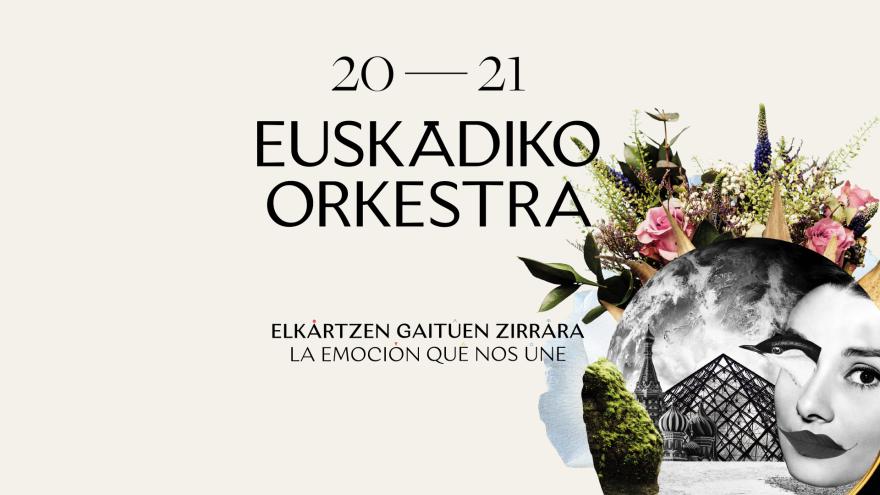
Performances of the complete Schubert symphonies – unprecedented in the Basque Country – from 25 September to 1 October, in the usual four capitals, will mark the beginning of a season which is hugely challenging logistically, and musically very ambitious.
The ongoing pandemic, and the resulting capacity restrictions in the main concert venues (Euskalduna, Kursaal, Principal and Baluarte), have forced the Basque National Orchestra to reorganise its season programme to accommodate its audience. The number of concerts has been doubled. Instead of the usual five per programme, there will now be 10: 4 in Donostia, and two each in Bilbao, Vitoria and Pamplona. The programmes and orchestral setup will differ from what was originally planned. General Director of the Basque National Orchestra, Oriol Roch, has this to say:
‘The opening of a concert season is always a time of joy, and this is the case now, despite the uncertain times we face and the consequent difficulties this poses to planning in detail. We are a national orchestra. We tour the country with great enthusiasm to bring our music to our season ticket holders and the public. This is why our season is currently so complex. We are tackling programmes with different characteristics and amid different circumstances, including double sessions in one single day or increasing the number of concerts in each programme. The times are different to those originally planned, and we have implemented a variety of solutions to get us through to March. After that, we will progress in whatever way the pandemic allows us to.’
In this context, after having reorganised the season programmes through to March, and provisionally postponing decisions about how to tackle the second section up to June, Oriol Roch also has this message for the public: ‘we ask our public for understanding, patience and cooperation at this time. We also want you to feel at ease. Our concert halls have gone to great lengths so that we are, and feel, safe during every performance.’
Schubert Festival
The Basque National Orchestra kicks off the season this Friday 25 September in Vitoria, Monday 28th and Tuesday 29th in San Sebastián, Wednesday 30th in Bilbao and Thursday 1 October in Pamplona. The concert season will get off to a unique start with performances of the complete Schubert symphonies in what is effectively a schubertiade or Schubert Festival. His eight symphonies can be heard for the first time in the Basque Country over five days and one hundred kilometres, with double sessions and 10 concerts across the four capitals where the orchestra is based. Vitoria will hear symphonies No. 1, 3, 6 and 9, Donostia will hear all over two days, Bilbao will be treated to No. 2, 4, 5 and 8, and Pamplona will close the festival with No. 1, 3, 6 and 9. This musical marathon is a completely new initiative in the Basque Country and is brought to the public in the spirit of positivity, energy and joy, enabling them to enjoy the healing power of music during these times of the pandemic.
Chief conductor Robert Trevino tells us why this inaugural programme is so intriguing:
‘I would like to invite you to our opening programme for the 20/21 season. We start this year with something very special: the complete Schubert symphonies. This festival, this initiative, is perfect for this orchestra and for the Basque Country right now. Franz Schubert is one of the greatest composers of all time, and his music constitutes much of the core repertoire of a modern orchestra. Many of these symphonies are almost forgotten and rarely performed. Hence, this is a wonderful opportunity to work with a smaller orchestra, bring together our audience and spread the music of Franz Schubert all across the Basque Country.’
Romanticism and much more for the rest of the season
The Schubert festival will be followed by other programmes: Wagner, featuring mezzo-soprano Rinat Shaham; Enigmatikoa, with Pablo Ferrández in the two cello concertos by Shostakovich; Aire Nordikoa, with pianist Behzod Abduraimov performing Piano Concerto No. 3 by Bartok and No. 1 by Beethoven; Supervivientes, which will include the first ever performance of Mis monstruos marinos by Mikel Urquiza (the second part of Elkano: Mundubira musika bidelagun), conducted by Ruth Reinhardt; and Los viajes, featuring violinist Vadim Gluzman performing Prokofiev’s Violin Concerto No. 2, conducted by Gemma New. This musical journey will be complemented by great symphonies from Schumann, Sibelius and Dvorak, bringing a sense of meaning to a season which focusses on the Romantic period.
After that, the orchestra has a programme in place through to June, but the status of the pandemic will determine how the remaining concerts are organised and held. Throughout this still uncertain portion of the season, we can expect to welcome conductors Hans Graf (conductor of the Basque National Orchestra from 1994 to 1996) and Anja Bihlmaier, as well as pianist Nikolai Lugansky, violinist Birgit Kolar and baritone Manuel Walser. Mahler and Rachmaninoff will be the most heavily featured composers in the repertoire from March onwards.
Concert safety measures
In addition to measures put in place by the venues to ensure audience safety, the concert programmes will be shorter and will not include an intermission to avoid the movement of people as much as possible.
We have also grouped season ticket holders to reorganise venue capacity in each city and provide our supporters with clear information on which concerts they will attend.
Concert tickets will be sold subject to availability (depending on capacity restrictions determined by COVID-19) and will be advertised on an ongoing basis. Those interested should check the orchestra website, euskadikoorkestra.eus, for the most up to date information.
Lastly, before kicking off a season which is hugely challenging logistically, and musically very ambitious, the orchestra wishes to convey an optimistic and healing message to its audience and to Basque society at this difficult time. Robert Trevino sums it up thus:
‘I would like to welcome you to the 20/21 season of the Basque National Orchestra. We have been thinking a lot, lately, about what home means. Perhaps, we have realised that home is not a place, but people. Orchestral music is a chance to come together as a community, for people to get together and share everything that makes us human: love, life, joy, happiness, excitement, imagination, childhood, old age and much more. This is what we are trying to do in the Basque National Orchestra. We want to join together with you to create a community and a home that revolves around music, because we need it more than ever. Come and be a part of your orchestra. We look forward to seeing you at our concerts.’
The Basque National Orchestra changes the dates of several auditions
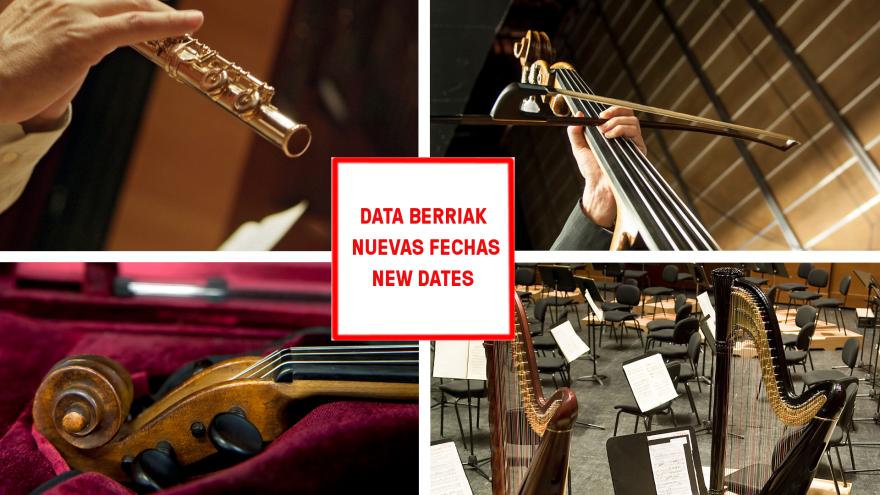
The Basque National Orchestra has changed the dates of three auditions: two for a seat in the orchestra (one flute tutti playing piccolo and two viola tutti) and one for double-bass extra musicians. Contrary to initial plans, these will now take place in August.
The harp soloist audition will still take place in early October, and the orchestra has announced a further audition in August for bass trombone extra musicians.
A few weeks ago, the Basque National Orchestra announced the opening of several selection processes for instrumentalists to complete their staff of musicians. After some calendar reshuffling, the dates have been modified and these auditions will now take place during August. The new dates are as follows:
Audition for double-bass tutti and soloist extra musicians
-Audition date: August 21st
-Application date: August 14th
Audition for 1 flute tutti playing piccolo
-Audition date: August 26th/27th
-Application date: August 17th
-Permanent contract with a 6-month trial period
Audition for 2 viola tutti
-Audition date: August 28th/29th
-Application date: August 17th
-Permanent contract with a 6-month trial period
The harp soloist audition date remains unchanged:
Audition for 1 harp soloist
-Audition date: October 2nd/3rd
-Application date: September 18th
-Permanent contract with a 6-month trial period
The orchestra has announced a further audition for bass trombone extra musicians.
Audition for bass trombone extra musicians
-Audition date: August 14th
-Application date: August 6th
Details of these auditions can be found here.
More information
Working for the orchestraThe Basque National Orchestra presents its 20/21 Season
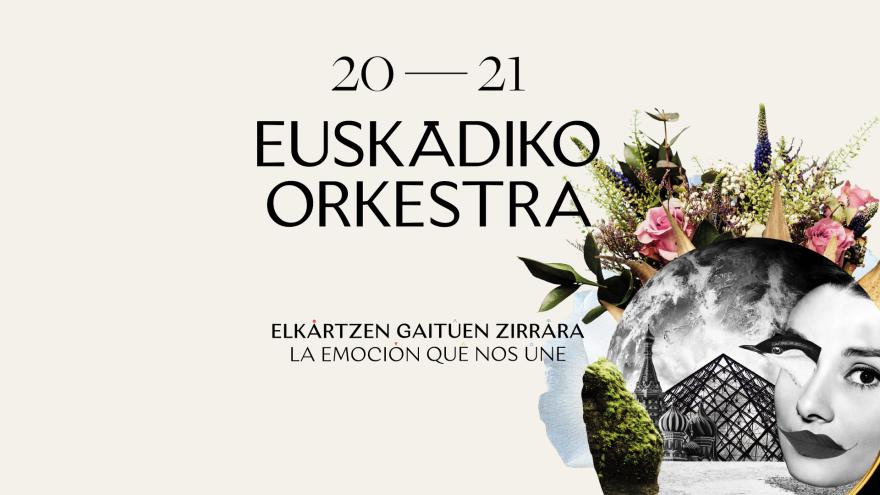
This season, the orchestra will place emphasis on the Romantic era. This will be clearly seen through the inclusion of all of Schubert's symphonies (as a Schubert marathon), as well as through the role of Schumann. Also important this season will be Wagner, who represents a break away from Romanticism. They will take us to other great composers like Mahler and Rachmaninoff.
This will be Robert Trevino's fourth season as main conductor. He will continue with his long-term musical vision and working on improving the orchestra artistically. He will conduct five concert programmes and take the orchestra on tour once again – this time through Italy (Udine, Bergamo, Brescia) and to Zagreb in April of 2021.
As our main conductor, Robert Trevino, points out, we have learned something important in these recent times of the pandemic: “home is not where the house is but where the people are. The recent trauma has been quite deep; we have seen the separation between us as a type of loss, and now we must work to close all those wounds. We regard the orchestra as a way to experience culture, passion, art... and as a way of affirming that ALL of that represents humanity.” That is why we would like to think of the Basque National Orchestra as that common place where we can all meet up again and repair our lives. We invite you to familiarise yourself with our programming and begin to enjoy it – but not without telling you first about what things will be like from now on and how we're going to go about our activities over the next few months.
Our new brand – Basque National Orchestra: The emotion that unites us
The Basque National Orchestra is launching its new identity – the result of long reflection and dialogue; an identity which continues to aspire towards increasingly more recognition. We have strengthened our sole name: Basque National Orchestra, which from now on will take the place of all our other names and acronyms (EO, OSE, EOS, etc.) which were used until now without helping to make our brand easier to recognise.
Organisational Planning
We have done initial organisational planning based on the premise of a possible 50% restriction to our capacity and that of complying with other safety measures brought on by the COVID-19 pandemic. What's more, we have changed the programming that had been designed initially and we have adapted our organisational approach. The first two subscription programmes will be held in the following way: for the first one (“SCHUBERT”), we will offer a double session in the afternoon (6:00 p.m. and 8:15 p.m.) to allow for half of our audience to be in each session. For the second one (“WAGNER”), we will work differently depending on the city, mainly by extending the programming by one extra day. For both cases, we will let our subscribers know about the day and time they will be able to enjoy their concert. By the end of August, we hope to be more certain of the measures that are to be applied in concert halls and, thus, we will wait until that time to confirm if these are the appropriate measures. We thank our audiences for their patience, understanding, and commitment and, especially, we thank them for their unconditional support. If it were any other way, we would never be able to manage these uncertain times successfully, especially considering that we have an extraordinary community of 7,000 subscribers.
Concert Times
After analysing the results of a survey carried out this season about the time for concerts to start and other matters of interest, with the participation of all the Basque National Orchestra subscribers, we have decided to move up the concerts of Bilbao, San Sebastian, and Pamplona to 7:30 p.m. (except for the two first programmes, affected by the COVID-19 circumstances). 62% of the survey responses in said three cities were in favour of moving up the start time; therefore, this measure has been adopted in the interests of improving attendance and organisation for all. Having said that, the traditional time of 8:00 p.m. was decided to be kept in Vitoria, as only 39% of the subscribers asked for the start time to be moved up.
Season programming
The 2020/2021 Basque National Orchestra Subscription Season will begin on 25 September in Vitoria, and it will wrap up on 17 June 2021 in the same city.
The season's main theme: Romanticism
This season features something that the orchestra hadn't featured for a while: a focus on the Romantic era. This will be seen through the inclusion of all of Schubert's symphonies, which will open the season as if it were a festival. Also prominently present will be Schumann. This season, we will showcase part of that Romantic era, but we will also see how Wagner will resoundingly break with said cultural idea and movement.
The season's unique project: a Schubert marathon
During the inauguration of the prior season, a unique project called 'Expectation' caught the attention of our audience – a project in which what the orchestra was going to play was not known. This new season aims to start off with another unique proposal: the marathon of symphonies by Schubert, divided between the four cities of the season. All the cities combined will represent the full marathon. Why are we starting off the season with a project like this one? Because, in the midst of so much uncertainty, we wanted to convey to our audience a certain ‘festival’ feel, involving a lively, fun, energetic spirit – something quite necessary in the current times. The preparation and interpretation of an entire series of symphonies in just one week is a demanding task that represents a new challenge for the orchestra.
Long-term lines of development
There are some long-term lines of development (many of which are clearly linked to the fact that Robert Trevino is our main conductor) which will continue to be touched upon throughout this new season.
- Mahler's prominence will continue – something which is bringing Trevino great international acclaim. As a sign of the importance that said bohemian composer still has, the orchestra will interpret his Symphonies 5 and 7 and a piece for voice: Songs of a Wayfarer.
- Since last season, Bartok has also been making his way into the orchestra's repertoire. He will be present in the Youth programme with Violin Concerto No.1, which will be interpreted by the orchestra's permanent guest concertmaster, Birgit Kolar.
- The case of Rachmaninoff is similar. We are including his Symphony No.1, which completes his three-symphony cycle after having offered the chance to hear his Symphony No. 2 and Symphony No. 3 in prior seasons.
- The Elkano: Mundubira musika bidelagun Project is another long-standing initiative that is continuing along this season. Mikel Chamizo was the one who first set off on this musical journey. Mikel Urquiza –whose piece Mis monstruos marinos (My sea monsters) could not be debuted in May and will be picked back up this season– will take up the baton where he left off.
- Exchange of musical pieces. Another important milestone this season will be the debut in Spain of Ghost Songs by Gary Carpenter of Britain. This is a piece that was jointly commissioned by four orchestras: Royal Scottish National Orchestra, Royal Liverpool Philharmonic Orchestra, City of Birmingham Symphony Orchestra, and the Basque National Orchestra. This piece's commissioning arose out of the close relationship that our orchestra has with the musicians of Liverpool; and this proposal will also be inversely beneficial as it has been agreed for the songs from the Elkano: Mundubira musika bidelagun project, as well as songs by other Basque composers, to be performed by their orchestras and introduced to British audiences.
- New additions to our repertoire: new pieces like those of the Elkano: Mundubira musika bidelagun project and the commissioned piece by Carpenter coexist with pieces that already existed but which the orchestra is adding to its repertoire for the first time.
Conductors, soloists, and choirs
The orchestra will once again receive a good handful of artists throughout its programming, although it is also worth noting that it will tackle three programmes alone, without guest soloists, allowing it to retain a leading performing role.
- SOLOISTS: We will once again welcome the great Pablo Ferrández (cello), Vadim Gluzman (violin), and Nikolai Lugansky (piano). And we will have Behzod Abduraimov (piano) and the baritone Manuel Walser for the first time. Birgit Kolar, the orchestra's permanent guest concertmaster, will debut as a soloist with the Basque orchestra.
- CONDUCTORS: Robert Trevino will continue to have great presence with five programmes, and the podium will likewise be shared by the experienced Hans Graf and Michel Tabachnik and three young female conductors: Ruth Reinhardt, Gemma New, Anja Bihlmaier.
- CHOIRS: The youth of Easo Abesbatza, the Easo Youth Choir, will be featured in the commissioned Carpenter piece, Ghost Songs, and the Orfeón Pamplonés Choir will be in charge of Salve Regina by Lorenzo Ondarra and Tristia by Berlioz.
Other activities
New international tour
Over the last three years, the orchestra has visited Austria (Linz and Bregenz) , Germany (Munich), France (Paris), and Turkey (Istanbul). Now it has planned a new international tour that will take it to Italy, playing for the first time in the cities of Udine, Bergamo, and Brescia, as well as to Zagreb, the capital of Croatia. This tour is confirmed and it is hoped to be undertaken in April of 2021, once again with our main conductor Robert Trevino.
Recordings
KALAKAN. First was a concert programme during the last season to perform Zuhaitz by Gabriel Erkoreka. Then came the desire to launch a project together, and now there is a recording that revolves around the figure of the bertsolari Xalbador, whose granddaughters (Aire Ahizpak) and Amets Arzallus will also participate. The recording will be directed by Unai Urretxo. A series of concerts is hoped to be held during the 2021/2022 season. This union will be a continuation of all the projects that the orchestra is sharing with Basque artists like Izaro, Zea Mays, Dr. Deseo, and Ken Zazpi – including the first artist of this crossover series, Benito Lertxundi.
Cooperation and synergies with other institutions
The orchestra will continue its commitment to the ABAO Bilbao Opera Season. Musika-Music of Bilbao and the BBVA Foundation Frontiers of Knowledge Awards Gala Concert. The orchestra's commitment cannot be undertaken in the context of the San Sebastian Film Festival with the traditional film soundtrack concert in the Velodrome, but the orchestra will play a special role in the San Sebastian Musical Fortnight and once again in Musikaste.
The Miramon Matinées and the Music Room cycles will be held once again this year and they will be presented in the future.
The new Season's image
The agency ACC Comunicación was the creator of the 2020/2021 season's image. They proposed that the season's main image be a collage of collages; an image made up of elements chosen from the rest of the programmes in order to create a composition that would be representative of the whole. The set of 10 images was obtained after extensive research work on the philosophy and background of the composers and programmes to be performed so as to find images and compositions with a symbolic and aesthetic value. All of this was done with a visual dimension that makes up a whole and a deep look into Romanticism as a main theme for the programming.
Special thanks
Lastly, the orchestra would like to thank all who have participated in its different activities for their cooperation and support: 7,000 subscribers and the general public, sponsors and partners, cultural actors, the media, etc. You make the Basque National Orchestra's activities possible.
The Basque National Orchestra is not just music; it is the celebration of life, of our community. That is why we welcome you here, to our home. We hope that you enjoy the new season and that now more than ever you will be our most staunch follower, continuing to accompany us at all our concerts.
Basque National Orchestra: the emotion that unites us
Information on subscription and ticket sales
Because of the current circumstances, we cannot yet guarantee that we will be able to accept new subscribers nor can we guarantee that we will be able to sell individual tickets for the concerts of the entire season. We will provide more information as it becomes available. In any event, you can continue to make requests via the orchestra's website (euskadikoorkestra.eus) and by telephone (943 01 32 32).
The Basque National Orchestra presents its new brand image

The Basque National Orchestra launches its new identity, the result of a long period of reflection and dialogue, and continues to aspire to increasing recognition.
The Basque National Orchestra was established in 1982 with the purpose of promoting and developing music as a universal asset and cultural heritage. In these 38 years, Basque society has undergone enormous transformations: what people understand by culture has changed, and the same is true of how they consume and relate to music and how brands communicate with their audiences. Today, just like Basque society as a whole, the Basque National Orchestra remains committed to this mission and they evolve together.
For this reason, the orchestra has carried out an exercise of reflection and dialogue that has enjoyed the collaboration and valuable contribution of musicians in the orchestra and external collaborators and friends of the Basque ensemble. This whole process has been carried out with the aim of assessing how to connect more with people and how to generate a greater impact in its role as a social and cultural agent.
Today, in this new context, the Basque National Orchestra is launching a new image which reflects its identity, its strong territorial links, its sensitivity to social transformation and, above all, its vision of a more cohesive and prosperous society through the universal and extraordinary power of its music.
This reflection has also included consideration of the way in which the orchestra presents itself to its different audiences and how it relates to them in the post-digital era. It will do so using two names:
-Euskadiko Orkestra, the main name to be used in the orchestra’s own territory and which from now on will take the place of all our other names and acronyms (EO, OSE, EOS, etc.) which up to now have been used inconsistently and have not contributed to strengthening recognition of our brand.
-At the same time, with the aim of continuing to increase our international impact, the name Basque National Orchestra has also been confirmed for the international scene.
The emotion that unites us
The new Basque National Orchestra brand is also accompanied by a new motto, ‘The emotion that unites us’. This captures the feeling that the music of the orchestra awakens: the passion that our own art and culture provokes, the feeling and the affection generated by the links with the orchestra’s own territory, culture, tradition and way of life.
It involves a way of feeling, understanding and experiencing that is encapsulated in a common emotion: the emotion that unites us.
The Basque National Orchestra strikes up on stage for an eight-concert mini season
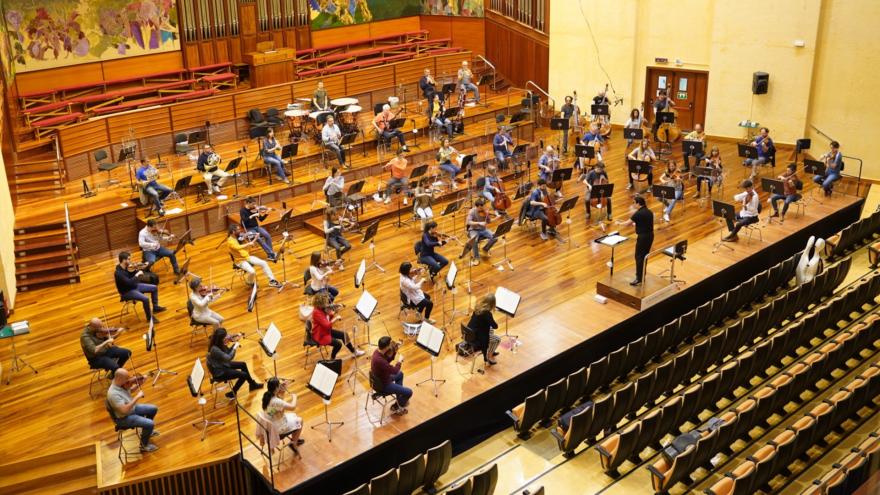
Unable to perform in the same space as its audience at this time, the Basque National Orchestra will broadcast to the public via TV and social networks.
It is the first orchestra in Spain – and one of the few in Europe – to return to the stage, and it will do so under the baton of its chief conductor, Robert Trevino.
Following its most recent concert on March 9th in Istanbul, which was a huge success but not without setbacks, members of the Basque National Orchestra were forced to isolate at home like everyone else. After two months without being able to work together and the cancellation of their most recent scheduled performances of the 19/20 season, the orchestra has adapted to the current circumstances to bring us an initial offering from its base in Miramon: a short season of eight concerts broadcast by the Basque public television service ETB. It is the first orchestra in Spain – and one of the few in Europe – to return to the stage.
Euskadiko Orkestra martxan!
This is the title of the short eight-concert season brought to you by a smaller ensemble of some fifty musicians. The orchestra is already rehearsing in its main headquarters in Miramon. Stage-layout tests have been completed, and there has been confirmation that the safety protocols in place are effective. This is still a large ensemble in which the musicians need to be physically close when performing the programmes, but under the current situation they must maintain a safety distance of two metres. Consequently, the musicians must learn to perform and to listen to each other in new and different ways so that the music flows. Here to bring the orchestra together is its chief conductor, Robert Trevino, who is at the helm of this eight-concert series. Each concert be a maximum of one hour long and will be recorded for subsequent broadcasting on Saturday mornings (11.00am) from May 30th on ETB2.
In addition to the Basque composers Ramon Lazkano and Mikel Urquiza, this short season will include works by Mendelssohn, Haydn, Mozart, Richard Strauss and Brahms, whose pieces are scored for a smaller orchestra with a maximum of 50 musicians. The orchestra will therefore strike up in a new way to bring music to its audience through the medium of television and streaming on its digital channels.
The first two programmes are as follows:
First programme: May 30th. ETB2, morning.
Agur Jaunak eta Andreak.
F. Mendelssohn: Symphony No. 3, “Scottish”
Orchestral ensemble: 50 musicians – 35 strings, 14 wind and 1 kettledrum.
Conductor: Robert Trevino.
Second programme: June 6th. ETB2, morning.
J. Haydn: Symphony No. 49, “La passione”
Orchestral ensemble: 40 musicians – 35 strings, 5 wind.
F. Mendelssohn: Symphony No. 1
Orchestral ensemble: 48 musicians – 35 strings, 12 wind and 1 kettledrum.
Conductor: Robert Trevino.
Subsequent programmes will be announced online and through the Basque National Orchestra's social networks.
Safety measures
The current circumstances require strict compliance with all preventive measures set out in safety protocols. Our priority is to ensure that all musicians and administrative staff are safe. All personnel have their temperature taken when entering the building and are notified that wearing a mask is compulsory until they go on stage. Inside the building, transit areas to the auditorium have been laid out in a circular floor plan so that everyone moves in the same direction and personnel do not have to pass one another. Shared dressing rooms are out of use, and instrument cases must be left in the seating area in an orderly manner. Once on stage, all musicians continue to maintain a safety distance from one another of two metres. The wind and percussion section is surrounded by protective screens.
Cancellations and the new reality
The orchestra was unable to complete the concert season scheduled through to early June in its headquarters in Vitoria, Bilbao, San Sebastián and Pamplona. More than 30 concerts were cancelled as a result. However, the orchestra has remained active during lockdown via its digital channels. Its activities have included a joint home-based performance of Agur Jaunak eta Andreak in tribute to society, the #EuskadikoOrkestraEtxean initiative promoting several musicians as they perform various pieces, and videoclips with the singer Izaro. The orchestra has been viewed thousands of times online thanks to this work. In parallel, work has been under way to bring the orchestra back together in what is a clear commitment to remaining a cultural standard bearer and an active part of society. So long as the orchestra is unable to perform directly to its audience, it will reach them with the help of Basque public television (ETB) and its digital channels.
International broadcast of this mini season
This series of concerts by the Basque National Orchestra will also be available on Stage Access – a soon-to-be-launched digital subscription platform with concerts, opera, dance and theatre – in an alliance that will bring the Basque National Orchestra to the North American market.
Performances: by order of rehearsal and recording
Anonymous (arr. J. Olaizola): Agur Jaunak eta Andreak
F. Mendelssohn: Symphony No. 3, “Scottish”
J. Haydn: Symphony No. 49, “La passione”
F. Mendelssohn: Symphony No. 1
W. A. Mozart: Symphony No. 31, “Paris”
F. Mendelssohn: Symphony No. 4, “Italian”
R. Strauss: Metamorphosen, study for 23 solo strings
W. A. Mozart: Symphony No. 41, “Jupiter”
W. A. Mozart: Serenade No. 10, “Gran partita”
Mikel Urquiza: Erio
L. V. Beethoven: Prometheus
Ramon Lazkano: Ttakun
J. Brahms: Serenade No. 2
M. Ravel: Le Tombeau de Couperin
M. Ravel: Ma mère l’Oye
#EuskadikoOrkestraEtxean
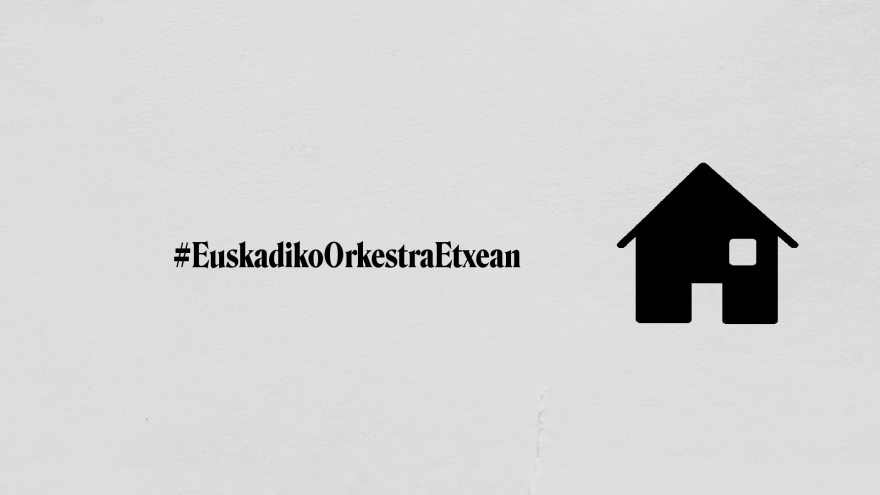
The Basque National Orchestra joins the call to stay at home for the duration of the health emergency that plagues our country and makes its own small contribution during this period of confinement in the form of a variety of multimedia content.
As we have all been urged by the public institutions and also in a spirit of social responsibility, in this current health emergency, the Basque National Orchestra has joined the call to stay at home. We also have announced the cancellation of all the concerts until the end of the Season.
For these difficult weeks of confinement that lie ahead, the Basque National Orchestra wanted to make available to its users and followers a whole selection of multimedia content. This is listed below and we will be enriching it with the incorporation of new material during this time:
A selection of the best videos
-Inaugural concert of the 19/20 Season: ‘Expectation’.
- Promenade overture (John Corigliano).
- Tuning up per orchestra (Edgard Varèse).
- Clapping Music (Steve Reich).
- Navigare necesse est (Mikel Chamizo).
- Erwartung (Arnold Schoenberg).
-Inaugural concert of the 18/19 Season: ‘Variations in the air’.
-Euskadiko Orkestra + Izaro:
-Euskadiko Orkestra + Zea Mays:
-Euskadiko Orkestra + Doctor Deseo:
-Music Room
Listen to the orchestra in concert
In the ‘In concert’ section on our website you can listen to numerous live recordings by the Basque National Orchestra. You can listen to complete works in high quality.
Programmes for the concerts not being held
- Season ticket programme 6, ‘Fantastique’: Bilbao / Pamplona / San Sebastián / Vitoria
- Season ticket programme 7, ‘Sheherazade’: Bilbao / Pamplona / San Sebastián / Vitoria
- Season ticket programme 8, ‘Golden Rule’.
- Matinée No.11, Belharra
- Matinée No.12, Wind and piano
And much more
Immerse yourself in the discography of the orchestra, browse through our photo galleries and follow us on our social networks (Facebook / Twitter / Instagram / YouTube) for more updated content.
